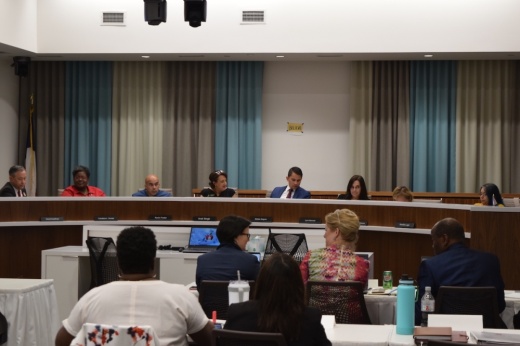The big picture
After trustees approved a pay raise for all teachers and staff at the May 18 board meeting, the projected fiscal year 2023-24 budget shortfall jumped to nearly $53 million. As a result, trustees are working against the clock to approve a budget for the upcoming school year by June 22. During the June 8 board meeting, trustees expressed they are in favor of approving the budget as is and coming back in September to amend it with the hopes that the state will approve more money for the district—ideally an increase in basic allotments.
What they're saying
"We started out this legislative session with very high hopes to use some of our state's $37.2 billion surplus to help public education," said Lynn Boswell, District 5 trustee and board secretary, at the meeting. "We're close to the end now, and there has been no increase in basic allotments."
Boswell said House Bill 100 proposed to increase the allotments by $90 per student in 2024 and $50 per student in 2025; however, no agreement had been reached during the regular session. The Legislature is in a special session, where lawmakers will continue to discuss school funding.
AISD Chief Financial Officer Ed Ramos presented the proposed budget at the meeting, noting there are several opportunities to reduce the overall deficit. Ramos also said the district is not alone in facing such a deficit.
"Urban districts throughout the state as passing similar budgets," Ramos said. "We will have to move forward with some tough decisions to remain financially stable."
The breakdown
To alleviate some of the deficit, Ramos and his team came up with a deficit-reduction plan. The plan, which reduces the deficit by about $15 million, includes:
- Position reductions through attrition, $1 million
- Evaluation of vacancy savings, $5 million
- Evaluation of contracts and software costs, $1.5 million
- Potential 2022 bond savings, $5 million
- Identifying and eliminating inefficient costs, $1.3 million
- Maximizing Title I funding, 1.2 million
Other options presented by Ramos to reduce the deficit include delaying investments, such as:
- The hiring of an ombudsman
- The formation of a research and evaluation department
- Slowing the expansion of Literacy First
- Discontinuing paper report cards
Trustees and Interim Superintendent Matias Segura agreed that reviewing an amended budget after the legislative session is over would be ideal. An exact date for that meeting has not yet been set.
Quote of note
"The Legislature has not done what they were supposed to do," said Arati Singh, at-large Position 9 trustee and board president. "We are being forced to do this because they are not using any of their $30-plus-billion in excess to help. I feel physical pain here; each of these line items we are having to consider is a child's life."





